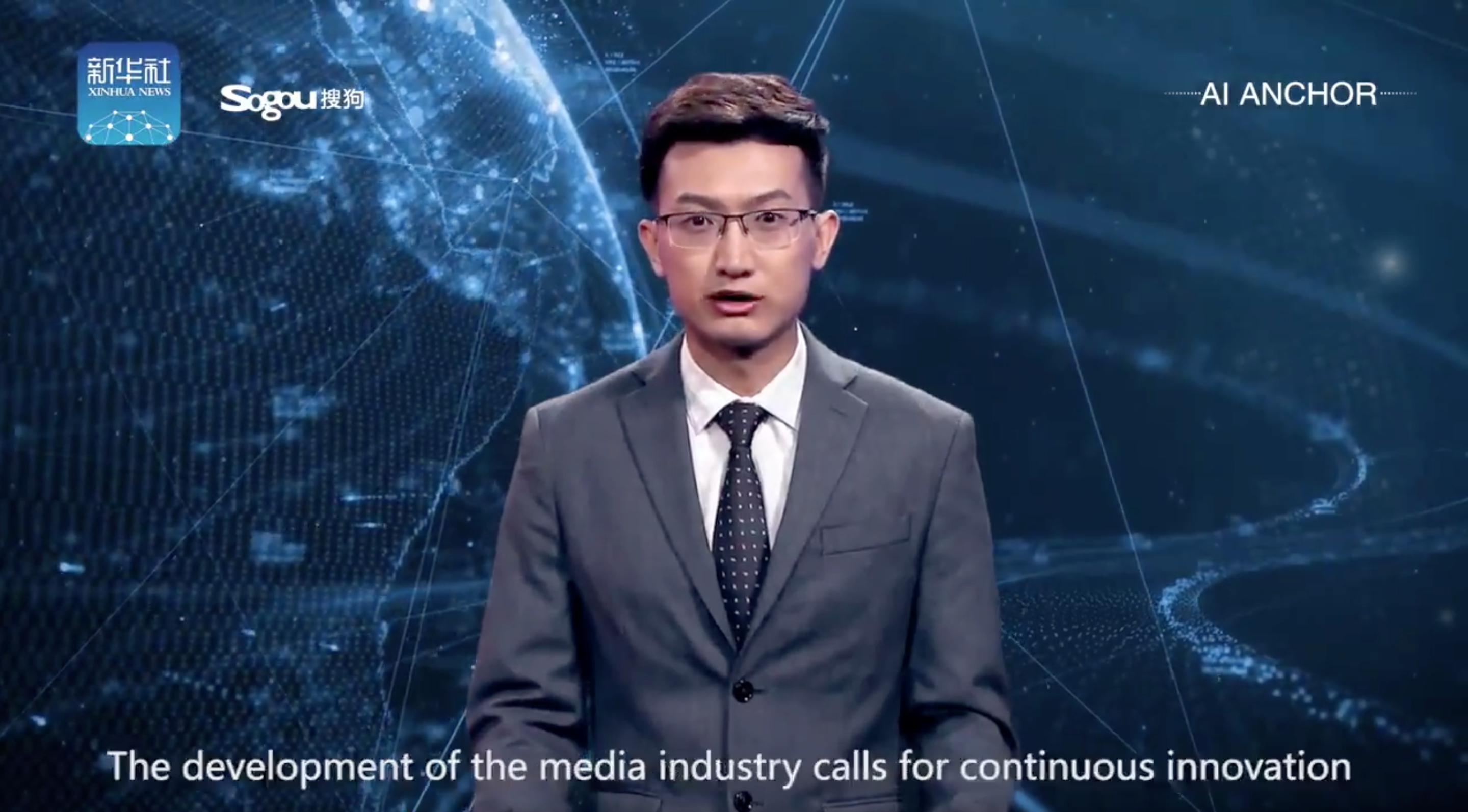Are China’s AI news anchors ‘propaganda machines’?
State-run media outlet Xinhua says virtual presenters will ‘reduce production costs’

A free daily email with the biggest news stories of the day – and the best features from TheWeek.com
You are now subscribed
Your newsletter sign-up was successful
China’s state-run news agency has unveiled two virtual news anchors powered by artificial intelligence (AI).
The computer-generated presenters - one for English-speaking audiences and the other for Chinese viewers - are based on two of the Xinhua outlet’s real-world news readers, mimicking their speech and facial expressions, the BBC reports.
Developed in conduction with Chinese search engine Sogou, the AI anchors are designed to deliver headlines 24 hours a day and made their debut this week at China’s annual World Internet Conference, in the eastern city of Wuzhen.
The Week
Escape your echo chamber. Get the facts behind the news, plus analysis from multiple perspectives.

Sign up for The Week's Free Newsletters
From our morning news briefing to a weekly Good News Newsletter, get the best of The Week delivered directly to your inbox.
From our morning news briefing to a weekly Good News Newsletter, get the best of The Week delivered directly to your inbox.
“Hello, you are watching English news programme,” says the English-speaking anchor in an introductory video on Xinhua’s Twitter page. “I will work tirelessly to keep you informed as texts will be typed into my system uninterrupted.”
The news agency says the algorithms can be used on its website and social media platforms, and will “reduce news production costs and improve efficiency”, CNN reports.
How does it work?
The AI system uses CGI renderings of Xinhua’s real-world news presenters, with the humanoids’ mouths moving in time with computer-generated speech.
A free daily email with the biggest news stories of the day – and the best features from TheWeek.com
The anchors are fed text by a human programmer, allowing producers to tweak scripts in real-time. As the AI anchor in the introductory video explains: “As long as I am provided with text, I can speak as a news host.”
The system could also be configured to work for “different clients in other industries”, The Guardian reports.
And in the future, it may be possible to customise each AI anchor’s appearance, so viewers could theoretically watch, say, their parents present the news, said Sogou chief Wang Xiaochuan.
Will it be used to spread propaganda?
Possibly. The Verge says that China’s press is “constantly censored” and that it is “nearly impossible” to find reports of “widespread events” that are unbiased.
As such, creating fake anchors to read propaganda, particularly if they mimic real-world reporters, will “strike many as a disturbing prospect”, the tech site adds.
AI ethics expert Professor Noel Sharkey, from Sheffield University, told the London Evening Standard that the news anchor algorithm could be used as a “big brother” tool, with an army of CGIs pumping out propaganda around the clock.
But others argue that more progress will need to be made in developing such AI anchors before they might pose a true threat.
Professor Michael Wooldridge, Oxford University’s head of computer science, told the BBC that the current AI versions are stuck in “uncanny valley”, a term used to describe human-like robots or animations that look “subtly unrealistic”.
“It’s quite difficult to watch for more than a few minutes. It’s very flat, very single-paced, it’s not got rhythm, pace or emphasis,” he said.
Woodbridge also believes that while news anchors have traditionally been viewed as trustworthy figures, “if you’re just looking at animation, you’ve completely lost that connection”.
All the same, he admits it was a “good first effort”, adding: “We will see it improve over time.”
-
 The environmental cost of GLP-1s
The environmental cost of GLP-1sThe explainer Producing the drugs is a dirty process
-
 Greenland’s capital becomes ground zero for the country’s diplomatic straits
Greenland’s capital becomes ground zero for the country’s diplomatic straitsIN THE SPOTLIGHT A flurry of new consular activity in Nuuk shows how important Greenland has become to Europeans’ anxiety about American imperialism
-
 ‘This is something that happens all too often’
‘This is something that happens all too often’Instant Opinion Opinion, comment and editorials of the day
-
 Claude Code: Anthropic’s wildly popular AI coding app
Claude Code: Anthropic’s wildly popular AI coding appThe Explainer Engineers and noncoders alike are helping the app go viral
-
 Will regulators put a stop to Grok’s deepfake porn images of real people?
Will regulators put a stop to Grok’s deepfake porn images of real people?Today’s Big Question Users command AI chatbot to undress pictures of women and children
-
 Most data centers are being built in the wrong climate
Most data centers are being built in the wrong climateThe explainer Data centers require substantial water and energy. But certain locations are more strained than others, mainly due to rising temperatures.
-
 The dark side of how kids are using AI
The dark side of how kids are using AIUnder the Radar Chatbots have become places where children ‘talk about violence, explore romantic or sexual roleplay, and seek advice when no adult is watching’
-
 Why 2025 was a pivotal year for AI
Why 2025 was a pivotal year for AITalking Point The ‘hype’ and ‘hopes’ around artificial intelligence are ‘like nothing the world has seen before’
-
 AI griefbots create a computerized afterlife
AI griefbots create a computerized afterlifeUnder the Radar Some say the machines help people mourn; others are skeptical
-
 The robot revolution
The robot revolutionFeature Advances in tech and AI are producing android machine workers. What will that mean for humans?
-
 Separating the real from the fake: tips for spotting AI slop
Separating the real from the fake: tips for spotting AI slopThe Week Recommends Advanced AI may have made slop videos harder to spot, but experts say it’s still possible to detect them